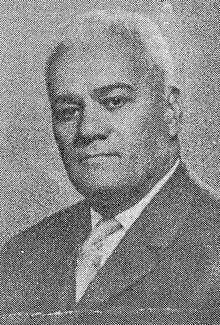Morteza Yazdi
Morteza Yazdi (Persian: مرتضی یزدی) was an Iranian surgeon and communist politician.
Morteza Yazdi | |
|---|---|
 | |
| Minister of Health | |
| In office 1 August 1946 – 16 October 1946 | |
| Prime Minister | Ahmad Qavam |
| Personal details | |
| Born | 1907 Yazd, Persia |
| Nationality | Iranian |
| Political party | Tudeh Party (1941–1954) |
| Other political affiliations | Communist Party |
| Relatives | Ebrahim Hakimi (foster father) |
| Alma mater | Berlin University |
Early life and education
Yazdi was born into a senior clerical family in 1907 in Yazd.[1] His father was a senior cleric who contributed to the Persian Constitutional Revolution.[2] Following death of his father, Ebrahim Hakimi served as his foster father.[3] He studied medicine at Berlin University,[1] and was associated with Taqi Arani during his presence in Berlin.[4] Following his return to Iran, he became involved with the Communist Party of Persia and subsequently was arrested as one of "The Fifty-Three".[1]
Career
Yazdi was among co-founders of the Tudeh Party of Iran in 1941.[5] Then he became a member of the party's central council,[6] and belonged to the party's moderate faction.[7]
He ran for a Tehran seat in the 1944 parliamentary election to no avail, garnering 4,719 out of some 41,000 votes (about 11.5%).[6]
Yazdi was named as the health minister in the Coalition government of Ahmad Qavam in 1946.[8] In 1949, he was sentenced to 5 years of imprisonment after the party was banned.[9]
In 1954, he was arrested again he was sentenced to death penalty for his activities,[3] however his punishment was reduced to imprisonment. After his release, he was no longer active within the party though he remained on friendly terms with them as late as 1979.[3]
References
- Abrahamian, Ervand (1999). Tortured Confessions: Prisons and Public Recantations in Modern Iran. University of California Press. p. 52. ISBN 0520922905.
- Abrahamian, Ervand (1999). Tortured Confessions: Prisons and Public Recantations in Modern Iran. University of California Press. p. 59. ISBN 0520922905.
- Abrahamian, Ervand (1999). Tortured Confessions: Prisons and Public Recantations in Modern Iran. University of California Press. p. 96. ISBN 0520922905.
- Jalali, Younes (2018), Taghi Erani, a Polymath in Interwar Berlin: Fundamental Science, Psychology, Orientalism, and Political Philosophy, Springer, p. 199, doi:10.1007/978-3-319-97837-6, ISBN 978-3-319-97837-6
- Abrahamian, Ervand (1999). Tortured Confessions: Prisons and Public Recantations in Modern Iran. University of California Press. p. 76, 78. ISBN 0520922905.
- Ladjevardi, Habib (1985), Labor Unions and Autocracy in Iran, Syracuse University Press, p. 45, ISBN 978-0-8156-2343-4
- Gasiorowski, Mark J.; Byrne, Malcolm, eds. (2004). Mohammad Mosaddeq and the 1953 Coup in Iran. Syracuse University Press. p. 112. ISBN 0815630182.
- Ladjevardi, Habib (1985), Labor Unions and Autocracy in Iran, Syracuse University Press, p. 141, ISBN 978-0-8156-2343-4
- Abrahamian, Ervand (1999). Tortured Confessions: Prisons and Public Recantations in Modern Iran. University of California Press. p. 86. ISBN 0520922905.